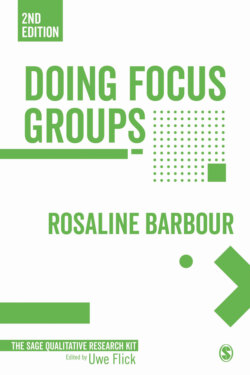Читать книгу Doing Focus Groups - Rosaline Barbour - Страница 16
На сайте Литреса книга снята с продажи.
Objectives
ОглавлениеAfter reading this chapter, you should:
have an appreciation of the particular advantages of focus groups;
be equipped to take a critical look at claims made about focus groups;
be able to distinguish between shortcomings and potential resources; and
have an idea of appropriate and inappropriate usages of focus groups.
In order to take a measured look at the opportunities and potential pitfalls involved in employing focus groups it is useful to re-visit past and ongoing debates relating to the capacity of focus groups and the challenges that their usage presents for the researcher – whether novice or, indeed, more experienced. This is the subject of the first section of this chapter.
Regardless of the specific approach taken, there are particular properties of focus groups that make them especially attractive to researchers seeking to widen engagement, both in terms of the participants that they can access, and the topics that they can address. This chapter highlights those assets of focus groups that render them an effective tool for researchers from particular disciplines, or professions. It also considers aspects of focus groups that make them amenable to addressing certain sorts of questions.
The main attributes of focus groups are then presented, including their potential for accessing the ‘hard-to-reach’ and the vulnerable; their suitability for addressing ‘difficult’ or ‘sensitive’ topics; and their capacity to capture responses to rapidly evolving situations. Examples are provided of some such applications across a range of research fields.
Next this chapter highlights some potential problems that can arise, including the limits of descriptive research and some of the issues raised by social marketing approaches (which frequently capitalize on the potential afforded by focus groups – most commonly to extend the reach of health promotion messages to include the ‘hard-to-reach’ or recalcitrant). This raises some difficult questions and the benefits of the insights provided by the community development model are once again emphasized to suggest how this issue might be more adequately addressed. While focus groups may allow for a rapid response in terms of researcher involvement as events unfold there are also dangers associated with the opportunistic use of focus groups (particularly when employed by researchers with little previous experience of this method). The – often overlooked – role of the researcher’s predispositions and interests in determining the way in which focus groups are used is also touched upon here. Some of the difficulties experienced by researchers are a result of misconceptions (including, as we have already, seen unreasonable expectations), which can lead to inappropriate usages of focus groups (such as eliciting ‘narratives’, measuring ‘attitudes’, or providing an easy, ‘quick and dirty’, route to data). With regard to the latter approach, the problems arising from a lack of attention to research design are emphasized.
